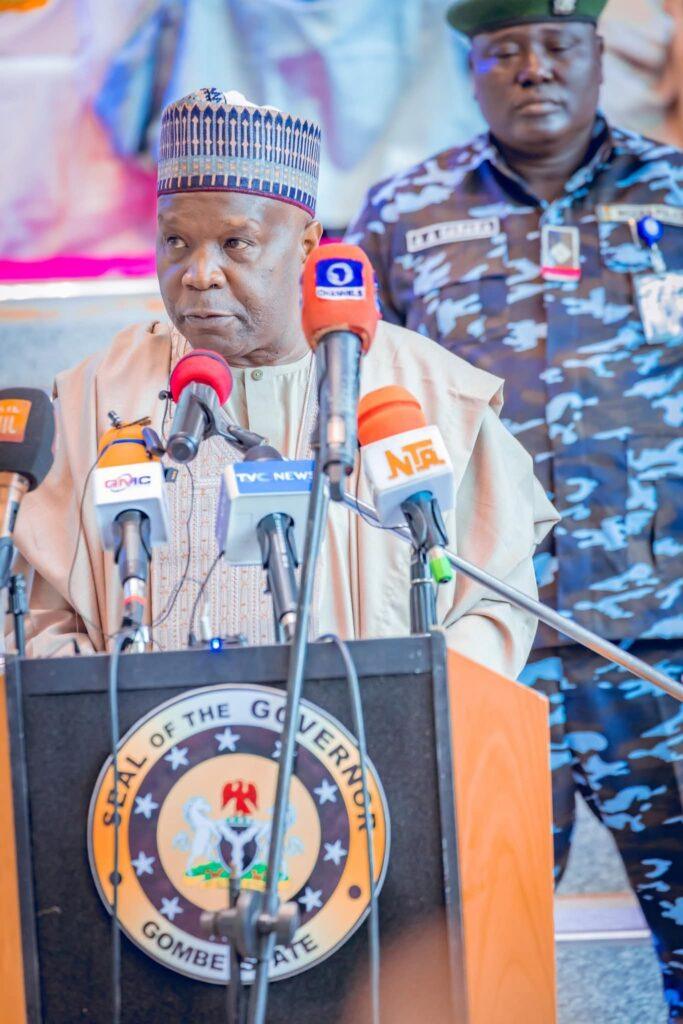Gombe State Governor, Muhammadu Yahaya, has declared support for the ongoing constitution review process, describing it as crucial for building a more inclusive and people-driven governance system.
Gov. Yahaya made the statement while declaring open the North-East zone public hearing on the review of the 1999 Constitution, held at the International Conference Centre, Gombe.
The hearing brought together key stakeholders from Gombe, Bauchi, and Taraba States to discuss constitutional amendments aimed at deepening democracy and national development.
“The constitution is a living document one that must be constantly updated to reflect the evolving needs and aspirations of our people,” the governor said.
Tracing Nigeria’s constitutional history from the 1914 Amalgamation to the current 1999 Constitution, Gov. Yahaya acknowledged previous amendment efforts in 2010, 2011, 2017, and 2023, but noted that critical issues remain unresolved.
These, he said, include federalism, local governance, fiscal decentralization, and protection of fundamental rights.
The governor called on the constitutional review committee to prioritize political stability through equitable representation and devolution of powers; economic prosperity by addressing fiscal federalism and resource control; and social justice by strengthening gender equity, the rights of marginalized groups, and the protection of all citizens.
Gov. Yahaya expressed confidence that submissions from the state government, presented by the Attorney-General and Commissioner for Justice, Zubair Umar, would be considered in the national interest.
He also urged broad participation from traditional rulers, civil society organizations, legal professionals, youth, and women’s groups.
Also speaking at the event, Chairman of the House of Representatives Committee on Constitutional Review for the North-East and Chief Whip of the House, Rep. Usman Kumo, explained that the review is mandated under Section 62 of the constitution.
He emphasized that the process seeks to ensure that Nigeria’s supreme law remains people-oriented and inclusive.
“In the House of Representatives, our Standing Orders empower us to periodically engage the public so the constitution remains a truly people-driven document,” Rep. Kumo said, assuring participants that the committee would apply principles of equity, justice, and fairness in its work.
He praised Gov. Yahaya’s leadership, commending him for executing projects that directly impact the lives of Gombe’s residents.
Read also:
- Gov. Yahaya reconstitutes membership of board, commissions
- Gov. Yahaya distributes subsidized fertilizer to farmers in Gombe
- Obasanjo, Gov. Yahaya commission ultra-modern seed factory in Gombe
Former Bauchi State Governor and consultant to the House Committee on Constitutional Review in the North-East, Mohammed Abubakar, said the exercise aims to foster robust dialogue between citizens and the National Assembly to shape a constitution that meets Nigerians’ aspirations.
Abubakar presented a compendium of proposed constitutional amendments grouped into thematic areas, including electoral reforms, judicial reforms, legislative changes, inclusive governance, security, devolution of powers, fiscal reforms, citizenship and indigeneship, fundamental human rights, and local government autonomy.
Among key proposals, he highlighted are conduct of all general elections on a single day, ending the current split between national and state elections, empower INEC to conduct local government elections or establish a new commission for that purpose, create a separate body to register and regulate political parties, leaving INEC focused solely on election conduct.
Others are the establishment of an electoral offences commission to prosecute electoral malpractices, limit appeals on governorship and legislative elections to the Court of Appeal, leaving the Supreme Court to handle only presidential election appeals, and empower legislative clerks, rather than presidents or governors, to proclaim the inaugural sittings of parliaments.
Other proposed amendments include reserving special seats for women in national and state assemblies, creating state police, integrating traditional institutions into governance, and enhancing fiscal reforms and protections for fundamental human rights.
